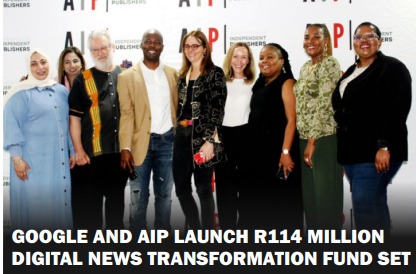SOUTH AFRICA – During the COVID-19 pandemic, several small and large news publishers were severely affected, to the point of shutting down their operations due to continued financial strain.
Post-pandemic, the situation has not improved. The decline of traditional revenue streams, particularly print advertising—which has been severely impacted by the shift to digital media—has made life difficult for independent publishers.
The Association of Independent Publishers (AIP) has collaborated with Google to establish the Digital News Transformation Fund (DNTF), an initiative to support the digital transformation of small, independent South African news publishers.
With a commitment of R114 million over three years (R38 million a year), the DNTF will provide project-based funding to help small, local news publishers develop and strengthen digital operations, improve audience reach and engagement, and enhance the sustainability of their journalism.
According to a statement, the DNTF seeks to recognise the importance of local and independent news publishers in maintaining a vibrant, trusted, and diverse public-interest news ecosystem. It also aims to address the resource challenges that have affected the ability of these publishers to plan for and embark on digital transformation initiatives.
AIP and Google said the DNTF is a vital step for media sustainability and digital transformation in South Africa.
Speaking at the prestigious launch event held on November 25, 2025, in Sandton, Anetta Mangxaba, chairperson of the AIP, described the DNTF as a ground-breaking moment for the country’s media landscape, stating that this is the largest-ever investment in community media. Mangxaba further highlighted the crucial role of community media, saying,
“This milestone underscores the vital role of locally driven journalism in fostering informed and empowered communities. For decades, community media have been the backbone of grassroots reporting, amplifying the voices of underserved populations and preserving culture and linguistic diversity.”
Mangxaba also noted that the fund reaffirms the importance of community media while presenting an opportunity for growth. She further shared the current plight of local media, saying,
“With this investment, the future of local media in South Africa shines brighter than ever. Local and independent publishers, long underfunded and under-resourced, now have a chance to rise. For too long, we have struggled with the digital divide, declining revenues, and rising printing prices. Today, we can finally say there is light at the end of the tunnel.”
Mangxaba appreciated the partnership between AIP and Google, which aims to proactively address the unique needs of South Africa’s independent and community publishers. She further explained how the fund will operate and who qualifies for support.
The fund will be administered independently by Tshikululu Social Investments, with fiscal oversight from a multi-stakeholder oversight and advisory board.
AIP and Google stated they have developed a detailed framework to ensure the DNTF carries out its objectives with transparency, credibility, and fairness. The fund will be subject to robust transparency and reporting mechanisms, with a list of all funded projects and beneficiaries made publicly available.
Beneficiaries must be small, local, and independent publishers or industry collectives committed to public-interest journalism and digital transformation. They must also be members of the Press Council of South Africa.
Notably, beneficiaries do not have to be members of the AIP or use Google products or services in their digital transformation initiatives.
Marianne Erasmus, Google News partner lead for Sub-Saharan Africa, said the DNTF aims to support local, independent, community, and vernacular language public-interest news publishers in building a solid digital foundation and developing practical data strategies to establish a resilient commercial model.
“We’ve consulted with and listened to news publishers and policymakers in South Africa to develop a funding framework that will meaningfully support the digital transformation needs of the local and community news ecosystem,” she said.
Erasmus elaborated on Google’s commitment to partnering with the AIP to achieve these goals. She continued, saying the new R114 million investment would fund digital transformation projects with clear and tangible technological or commercial goals proposed by the local news ecosystem.
“The funding will run over the course of three years and will be accompanied by ongoing training on digital skills and fundamentals through the Google News Initiative,” she said.
The fund is expected to open its first round of applications by March 2025, following industry and stakeholder consultations on its approach to funding and the finalisation of its structures and policies.
Outlining the way forward, AIP Executive Director Dr. Kate Skinner said, “The pressure is on. We need to start accepting application proposals in March 2025. Prior to that this will need developing funding policies, establishing a trusted funding board, and setting up an adjudication panel.”
For more information about the DNTF, including eligibility criteria, governance mechanisms, and updates on the application process, publishers are urged to visit http://aip.org.za/fund.
Delmas suspected drug dealer only spent two days in jail
Delmas- A drug bust in Botleng sparked anger among residents after a 28-year-old male suspect, caught with narcotics worth more...
























